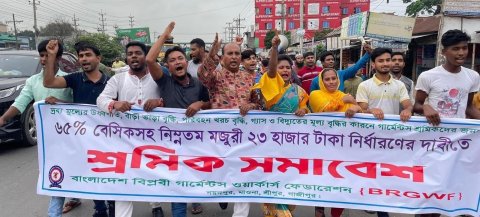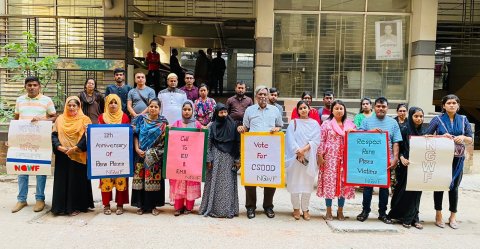
Photo: Last year, people laid wreaths at the Rana Plaza site to
mark the 10-year anniversary (NGWF).

Photo: Protesters in Bangladesh demanding a living wage (BRGWF).

Photo: Union members call for due diligence legislation
on the 11th anniversary of Rana Plaza (NGWF).
On the 11th anniversary of the Rana Plaza tragedy, we stand in solidarity with the survivors and families of the thousands of garment workers who were killed or injured in this devastating tragedy.
For over a decade prior to the collapse, workers, unions and national and international labour rights organizations had been raising concerns of fire and building safety in the country and had developed a legally-binding agreement for brands and unions to sign to make factories safer. However, it took this highly preventable tragedy to finally bring a group of major brands together to sign the Accord on Fire and Building Safety in Bangladesh and for an increasing number of brands to sign on to its successor agreements, including the International Accord for Health and Safety in the Textile and Garment Industry, and the newly inaugurated Pakistan Accord.
These important agreements have brought significant improvements in fire and building safety conditions in close to two thousand factories. Fire-fighting equipment has been installed, locks on fire exits have been removed, electrical wiring has been upgraded, structurally unsafe buildings have undergone large-scale renovations and workers have received trainings on health and safety and how to access the Accord’s complaint mechanism.
Despite these life-saving improvements to fire and building safety, however, major brands and retailers, such as Canadian Tire, Levi’s, IKEA, Amazon and others refuse to join the more than 200 brands who have, to date, signed on to the International Accord.
Poverty Wages
Meanwhile, today, Bangladeshi workers continue to receive extremely low wages that do not meet their basic needs. The minimum wage increases in 2013, 2018 and November of 2023 have been insufficient to meet worker’s daily cost of living, and in the five-year intervals between each highly undemocratic wage review process, inflation has made it increasingly difficult for workers to put food on the table. Last year’s increase to 12,500 BDT (US$113) is little over half of what unions were demanding based on cost of living calculations, and constitutes a mere fraction of a living wage.
Unions and labour rights organizations reached out to the major brands who source from Bangladesh asking them to support workers’ demand for an adequate increase in the minimum wage; however, statements sent by individual brands, industry associations and multi-stakeholder initiatives did not include commitments to increase the prices they pay to Bangladeshi suppliers to make payment of a living wage possible.
Violent repression, criminalization and bogus arrests
Widespread protests erupted in November 2023 and into the new year as workers expressed their outrage at the government’s announcement of the woefully low increase to the minimum wage. The protests were met with violent repression, which caused four deaths and many more injuries. At least 35 police reports were filed by factory owners against workers and union leaders who had taken to the streets. Many workers were jailed for more than two months in unsanitary, overcrowded prisons.
According to Rashadul Alam Raju, General Secretary of the Bangladesh Independent Garment Union Federation (BIGUF), "Trumped up legal complaints against unnamed workers instill fear among workers and organizers, because anyone could be identified as a culprit in a case. Several union organizers, including from my union, have spent time in prison for an alleged crime that happened while they were on the other side of town.”
Labour rights organizations have urged the major international clothing brands that source from the factories whose owners have filed these cases to ensure that the charges are withdrawn. While this has led to the withdrawal of several cases, approximately two dozen remain active. Brands like H&M, Inditex (Zara), Next and C&A should do more to ensure that their supplier factories withdraw these baseless criminal cases.
These legal cases have a further chilling effect on worker organizing in Bangladesh. Despite some initial improvements in the years directly following the Rana Plaza collapse, it remains exceedingly difficult to register a union in Bangladesh and violence and harassment against organizers is common. In June 2023, Bangladesh Garment and Industrial Workers Federation organizer Shahidul Islam was beaten to death after leaving negotiations with the Prince Jacquard Sweater factory about wages, and earlier this year, two organizers of the Akota Garment Worker Federation were attacked and hospitalized after leaving a factory they were trying to organize.
For more information:
- Bangladesh: Garment workers must receive rights-based compensation and justice immediately (Amnesty International, May 1, 2024)
- 11 years since the Rana Plaza collapse, factories are safer but the root causes of tragedy persist (CCC)
- Rana Plaza Never Again site, including a timeline, a petition calling on brands to sign the Accord, and a page to leave commemorative messages (CCC)
- Take Action: Call on Amazon to sign the International Accord (Make Amazon Pay campaign)
- Bangladesh: Workers mobilize for 23,000 Taka minimum wage (MSN)
- Which brands have signed the safey Accord (and which brands have not)? (CCC)